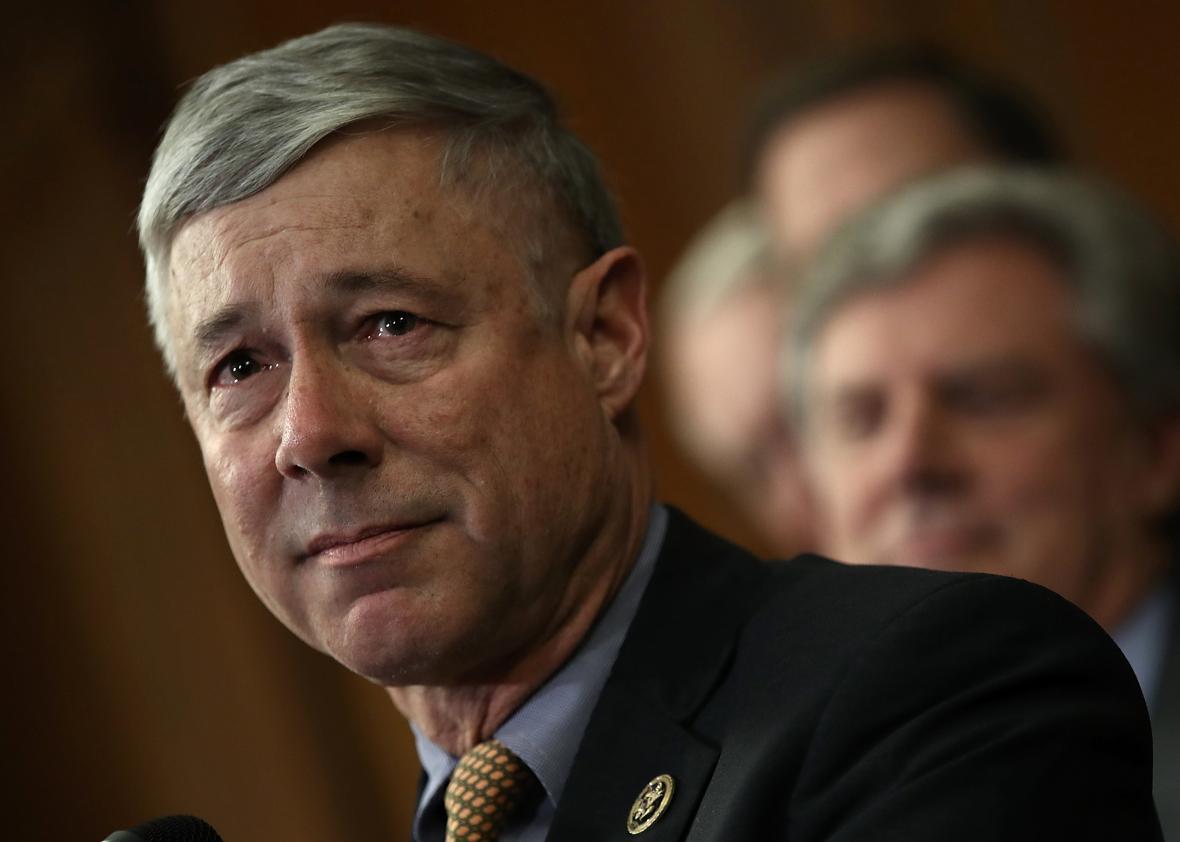Trumpcare II seemed to be spiraling toward its demise on Tuesday, after Rep. Fred Upton announced his opposition to the legislation on the grounds that it didn’t do enough to protect Americans with pre-existing conditions. As a former chairman of the House Energy and Commerce Committee, the relatively moderate congressman from Michigan (emphasis on relatively) is considered a key voice on health care issues—in fact, he’s written a number of Obamacare repeal bills himself. If Upton were a no, it would seem unlikely that Republican leaders would be able to find 216 votes for their unloved Frankenlaw.
On Wednesday, however, Trumpcare got a fresh jolt of life. Both Upton and Missouri Rep. Billy Long, a Trump ally who surprised many when he voiced his own opposition on Monday, announced that they now supported the bill thanks to an amendment Upton negotiated that will provide $8 billion over five years to help those with pre-existing health problems afford insurance.
While House leaders have not released any legislative text for the Upton amendment, all signs suggest that it is just the latest in the long line of cynical, nonsensical policy compromises that have shaped Trumpcare—a bill that would ultimately cut about $1 trillion from health spending in order to finance tax cuts for the wealthy. The $8 billion is an essentially insignificant sum of money that would do little to help sick Americans afford coverage, yet could still destabilize the individual insurance market. It’s a political fig leaf for nervous Republicans worried about angry constituents, and not much more.
GOP moderates have been balking at Trumpcare because it would allow states to opt out of the rules that currently prevent insurers from discriminating against customers with pre-existing medical conditions. Carriers would not be allowed to deny customers coverage outright based on their health status. But companies could charge sick Americans more if they failed to stay continuously enrolled in a health plan. So, for instance, if someone with a heart condition lost their job and had to go uninsured for a while, they’d risk being completely priced out of the individual market going forward. Trumpcare would require states to create high risk pools of subsidized insurance for the sick before they could obtain an opt-out waiver. But the bill only provides $130 billion for the pools over 10 years, which is probably not enough money to adequately fund them. Years ago, conservative wonks suggested that a national high risk pool would require $15 billion to $20 billion annually to function; the Center for American Progress says it would take another $200 billion on top of what the GOP has offered up.
Into this gap steps Fred Upton. According to Axios, his $8 billion amendment would create “a fund to pay the penalty for not being previously insured for those who get priced out from the market based on health status.” So apparently it’s not more money for high risk pools, but rather a separate jar of cash to pay insurance premiums on the individual market.
The first, most obvious problem with this plan is it entails a pitifully small sum of money that would run out quickly. Nobody who thought that $130 billion was insufficient to help people with pre-existing conditions could seriously believe that adding another $8 billion over half a decade would solve the problem. It’s an empty gesture, a way for Republicans to claim they aren’t just tossing sick people into something ominously called a “high risk pool.”
While it might not help the sick, the Upton amendment could still create some nasty distortions in the insurance market. Again, reports so far suggest that the money would somehow be used to pay the extra premiums insurers charge people with pre-existing conditions who don’t stay continuously enrolled in coverage. As Democratic Sen. Ron Wyden quickly pointed out on Twitter, that just invites carriers to charge sky-high prices for the customers, knowing the government will pick up the tab. It would give Aetna a license to fleece taxpayers.
Meanwhile, conservative health care writer and Reason editor Peter Suderman suggests the Upton amendment could also discourage people from buying insurance until they get sick, since the government would supposedly have a fund waiting around to pay for the extra cost of their coverage. That would likely keep some healthy Americans out of the individual market—setting insurers up for a destabilizing adverse selection issue.
Again, we have yet to see any legislative text yet. But at this point, the Upton amendment mostly appears to be a hollow political prop with little policy rationale or chance of doing much good for the vulnerable Americans who could be priced out of health insurance under Trumpcare. The change is useful in only one respect: It shows how little it takes to get some “moderate” Republicans to vote for an absolutely vicious bill.
